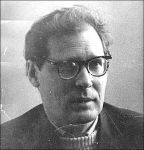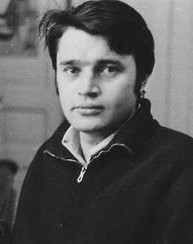The publishing house Khronika Press has issued a volume In Defence of Sergei Kovalyov (New York, 1975). It contains a short biography of Kovalyov and two letters: one from Yury Golfand, Doctor of Physical and Mathematical Sciences (27 March 1975) and the other from George Wald of Harvard University’s biology department (September 1975).
Yu. Golfand expresses a high opinion of S. Kovalyov’s position as a citizen:
“This man has the highest and most noble convictions. He is deeply convinced of every man’s right to express his thoughts openly and directly, and to defend his beliefs. He is always ready to protest against injustice, against any infringement of human rights, against illegality and arbitrary violence. In his social activities Sergei Kovalyov is always guided by these high principles, and displays exceptional goodness and spiritual sensitivity.”
The author underlines Kovalyov’s professionalism, that of a talented biologist, and regards his work as original and of great scientific interest.
Wald’s letter, “In Defence of those who Defended Others”, besides presenting the basic facts about Kovalyov’s social and scientific activity, reports on the persecution of other members of the Soviet Amnesty International group.
*

On 2 September 1975 a group of professors and staff members at Leiden University (in the Netherlands) appealed to V. Kotelnikov, acting president of the Soviet Academy of Sciences, asking him to take action on behalf of the scientists Kovalyov and Tverdokhlebov. “To our dismay,” the letter reads, “we have found out from our colleagues and members of your Academy that Drs Kovalyov and Tverdokhlebov have been denied freedom of speech. We fear that their arrest may have a serious impact on the development of scientific contacts between the Soviet Union and other countries.”
A copy of this letter was sent to the Soviet ambassador in the Netherlands.
*
In an open letter to Amnesty International and the International Commission of Jurists, Academician Sakharov refers to the approaching trials of Sergei Kovalyov and Andrei Tverdokhlebov and says that one of the main reasons for their arrest was their participation in Amnesty International. Sakharov calls on these authoritative international organizations to
“send their observers and qualified lawyers, who will be independent of the Soviet authorities, to the trials of Kovalyov and Tverdokhlebov, so that they can take part in the trials and help to ensure that the accused are afforded their full right to a defence”.
On 6 October A. Sakharov appealed to L. N. Smirnov, Chairman of the USSR Supreme Court, asking him to grant free entry to Sergei Kovalyov’s trial in Vilnius to Kovalyov’s friends and also to representatives of the international press and Amnesty International, of whose Soviet group Kovalyov is a member. Sakharov received no answer to his letter.

On 21 October 1975 T. Velikanova, A. Lavut and Yu. Orlov appealed to Amnesty International, the International Committee of Human Rights (Paris), and the International Association of Democratic Lawyers, about the fact that Kovalyov and Tverdokhlebov were being denied the right to defend themselves: the lawyers they had chosen had not been allowed to take their cases. In addition, the authors of the letter raise the question of the infringement of lawyers’ rights in the USSR: in political trials the lawyer’s right freely to choose his client is denied; a secret and illegal system of “permits” exists, according to which only certain lawyers are allowed by the Presidium of the Bar to appear in “special cases”.
The authors of the letter ask the addressees to act without delay and:
— to demand that the Soviet government lift the discriminatory ban on Kovalyov and Tverdokhlebov which prevents them from choosing their own lawyers;
— to invite foreign lawyers to take part in the defence of Kovalyov and Tverdokhlebov, together with Moscow lawyers, and to petition for their admission to the trial on the basis of Article 47 of the RSFSR Code of Criminal Procedure;
— to remind the Soviet leaders of their promises to observe the Covenants on Human Rights which have been ratified by the USSR Supreme Soviet.
On 26 October V. F. Turchin, chairman of the Soviet Amnesty International group, issued a statement for the press.
He rejects the assertion of the procurator’s office, frequently repeated, that Tverdokhlebov’s involvement in the foundation and work of the Soviet Amnesty International group bore no relation to his arrest.
A list of facts is presented in the statement concerning the searches and detentions of members of the group on 18 April, the day of Tverdokhlebov’s arrest [CCE 36.1], about the arrest of group member Kovalyov, and about Turchin’s interrogation concerning the Kovalyov and Tverdokhlebov cases. (“From the nature of the interrogations in the Tverdokhlebov case it is clear that the records of them… will become part of my own case, which, as I have recently learned, already exists.”)
After referring to the humane and politically neutral character of Amnesty International, Turchin says:
The activities of Andrei Tverdokhlebov and Sergei Kovalyov in defence of basic human rights in the USSR and throughout the world were not only completely free of any elements of violence or calls for violent action but were fully within the framework of the very restrictive laws existing in the USSR. Their arrest, and the sentences which threaten them and which would put them into the very severe conditions of the Soviet penal system, are the result of a broad interpretation of the laws whereby each word of truth that the authorities don’t like is labelled slander.
Turchin calls on “all those who are not indifferent when people are punished for being better and more honest than others to speak out in defence of Andrei Tverdokhlebov and Sergei Kovalyov”.